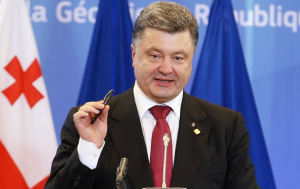EU, Ukraine, Georgia, Moldova. Is the signing a milestone?
27 Jun 2014Ukrainian President Petro Poroshenko in Brussels signed the Association Agreement with the European Union. The signing is a milestone. Whether history records June 27 as Ukraine’s “most important day” since it regained independence in 1991—as Mr. Poroshenko suggested—remains to be seen. Much depends on implementation of the agreement. 
The economic pact comes months after deadly protests broke out this winter when then-Ukrainian president Viktor Yanukovych — ousted by demonstrators in February — decided not to sign the trade deal under pressure from Moscow.
Georgia and Moldova also signed association agreements with the EU in a move opposed by Russia. Georgia has already lost chunks of its territory and Black Sea coast to rebels backed by Russia after a brief war with Russia in 2008.
“There will undoubtedly be serious consequences for Ukraine and Moldova’s signing,” Grigory Karasin, Russia’s deputy foreign minister, said.
The Association Agreement can be a game-changer for Ukraine. It includes a deep and comprehensive free trade arrangement (DCFTA) that will open much of the European market to Ukrainian exports. Implementation of the agreement will not only bring Ukraine’s trade and customs rules into conformity with EU standards, it will help the country draw closer to EU democratic norms and “Europeanize” other Ukrainian regulatory regimes.
The Association Agreement lacks a membership perspective
For the European Union, signature of the association agreement with Ukraine (as well as signature of similar pacts with Georgia and Moldova) represents a significant step forward in its Eastern Partnership policy.
For the Kremlin, signature of the Ukraine-EU association agreement represents a setback. Vladimir Putin last December offered $15 billion in loans, with no overt strings attached, and a huge gas price cut to turn Ukraine away from signing.
- In: CIS, EU Eastern Dimension, Ukraine
Comment Form
Welcome
We are a group of long experienced European journalists and intellectuals interested in international politics and culture. We would like to exchange our opinion on new Europe and Russia.
Categories
- Breaking News (11)
- CIS (129)
- Climate (2)
- Energy&Economy (115)
- EU Eastern Dimension (85)
- Euro 2012 – Sochi 2014 – World Cup 2018, Sport (43)
- Euro-Integration (135)
- History Culture (198)
- International Policy (261)
- Military (74)
- Interviews (18)
- Italy – Italia – Suisse (47)
- Odd Enough (10)
- Poland and Baltic States (126)
- Religion (31)
- Russia (421)
- Survey (4)
- Turning points (4)
- Ukraine (176)
- Российские страницы (113)
Archives
- November 2020
- October 2020
- September 2020
- August 2020
- July 2020
- May 2020
- April 2020
- March 2020
- January 2020
- December 2019
- November 2019
- October 2019
- September 2019
- August 2019
- July 2019
- June 2019
- May 2019
- April 2019
- March 2019
- February 2019
- December 2018
- November 2018
- October 2018
- September 2018
- August 2018
- July 2018
- June 2018
- May 2018
- April 2018
- March 2018
- February 2018
- January 2018
- December 2017
- November 2017
- October 2017
- September 2017
- August 2017
- July 2017
- May 2017
- March 2017
- January 2017
- December 2016
- November 2016
- October 2016
- September 2016
- July 2016
- June 2016
- May 2016
- April 2016
- February 2016
- January 2016
- November 2015
- October 2015
- September 2015
- June 2015
- April 2015
- March 2015
- February 2015
- January 2015
- December 2014
- November 2014
- October 2014
- September 2014
- August 2014
- July 2014
- June 2014
- May 2014
- April 2014
- March 2014
- February 2014
- January 2014
- December 2013
- November 2013
- October 2013
- September 2013
- August 2013
- July 2013
- June 2013
- May 2013
- April 2013
- March 2013
- February 2013
- January 2013
- December 2012
- November 2012
- October 2012
- September 2012
- August 2012
- July 2012
- June 2012
- May 2012
- April 2012
- March 2012
- February 2012
- January 2012
- December 2011
- November 2011
- October 2011
- September 2011
- August 2011
- July 2011
- June 2011
- May 2011
- April 2011
- March 2011
- February 2011
- January 2011
- December 2010
- November 2010
- October 2010
- September 2010
- August 2010
- July 2010
- June 2010
- May 2010
- April 2010
- March 2010
- February 2010
- January 2010
- December 2009
- November 2009
- October 2009
- September 2009
- August 2009
Our books




